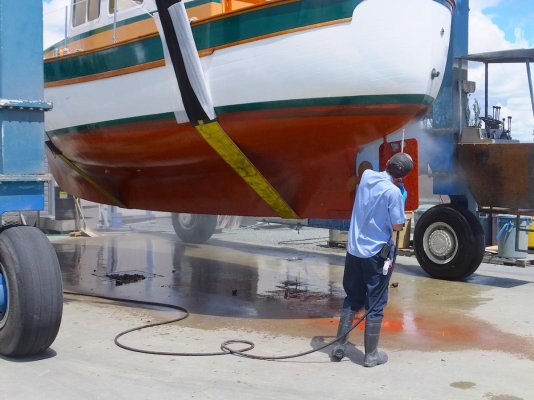The compressor you suggested costs $67.00
A hookah set up costs around $2500. You don't think there's a reason for that ?
The manufacturer of that compressor says its for "inflation only"
It has a duty cycle of 20 minutes....then it needs to be turned off!!!
Industrial compressors are not tested for air quality or reliability that's necessary for life support equipment.
Compressors for diving usually have a reserve tank to deal with fluctuations in the compressor and the divers needs.
Compressors for diving have been tested to supply enough air to safely dive at the rated depth.
I'm sure the filtration requirements are different as well, but of course you took off your filter so I guess that doesn't matter in your case.
If you want to trust your life to a $67 compressor that's certainly your perogative. Recomending that others do it is reckless.
If anyone is considering doing this, talk to someone you trust who understands the risks involved with diving and the effect that pressure can have on your body.
Hookah compressors flow insane amounts of air and you need it for DIVING. For cleaning a hull it's overkill.
The reason the 1050 has a duty cycle of 20 minutes is because it runs continuous with an on switch. Simply wire in a pressure switch of your choice and it's good to go. I've used that 1050 many times for what we are talking about here.
I dont even really recommend that setup in my first post but presented it as an option that has worked for me. I also posted about how to build a compressor with a 7 gallon aluminum tank that will rival ANY off the shelf compressor.. I agree with what you said about breathing from steel tanks. I do like that it's 12v vs 110 for marine uses though.
The big question is if the $67 compressor is adequate and i'll say "it depends" is there a question of it being dangerous? That also depends.
If try a 40' dive with it and it dies you'll have a few breaths in the line without a tank.. Not a good idea. 2' under the boat? If you can get under there with a snorkel you'd be much better off.
No need to be aggressive and disrespectful this is a community of like minded people and not youtube comments section.

The $700 hookah compressors use the same interior parts as oil-free compressors(some are teflon coated/or diaphragm pumps).
Next part isn't for you as you seem well versed on the subject but I want another disclaimer to my post.
Do not confuse this with a oiled compressor.. They compress oil right through the line and into your lungs and will kill you quick. A water separator wont do any good with the toxins you inhale.
This might be where your confusion over compressors for inflation or a standard off the shelf compressor as in the past most of them were oiled compressors(I have a 28 gallon oiled in my garage).
Also there's mil-spec diving hoses that are safe for breathing and they cost quite a bit more than off the shelf pvc or poly.. Dont even think about breathing through one..
The biggest difference(and only difference really) is the performance of the hookah compressor some of which can flow 7cfm @ 40psi vs the 1050 2.5cfm @ 90psi(which is still impressive) the harbor freight(or any oilless 3 gallon with a steel tank) will flow about .7cfm @ 90psi.
A DIY hookah setup is not for everyone(the opposite I suspect) but with enough research you could build a hookah setup to rival the best for half price or a hookah setup for cleaning the bottom of your boat(what were talking about here) for much much cheaper.
Also keep in mind I dive with guys who have off the shelf units and they dive with mine so I know the performance envelope between certain setups and have even repaired some of my friend's units. I have many hours of research before taking this on but i'm not a professional by any means.
There are 100's of threads on DIY hookah and they are met with mild interest or blind rage by divers.. Bringing up $2,500 vs $67 as a concern to what "you'd bet your life on" makes sense on the surface but I challenge you to dig deeper on why they cost that much and i'm not saying they aren't worth it because they flow tons more air for once again.. Divers.
Here's a link to one of the best diaphram "hookah compressors" for $399(Keene T80). You'll need to drive the pump but even with breathing hoses and other parts it's far from $2,500.
Medium Duty Compressor: Keene Engineering Online
FWIW for hull cleaners the Thomas 1020 is the industry standard. While used in hookah hull cleaning it wasn't designed for that purpose. Simply compresses clean air(oil-free air). I'll also note that the Masterflow 1050 flows more air than the Thomas 1020 and it is also an oil-free piston driven pump the same as the 1020(2.5cfm vs 2.1cfm @ 90psi

)
YMMV and sorry if I hurt anyone's feelings or sounded "matter of fact". Just trying to be a nice guy and share some info to those who are interested.






